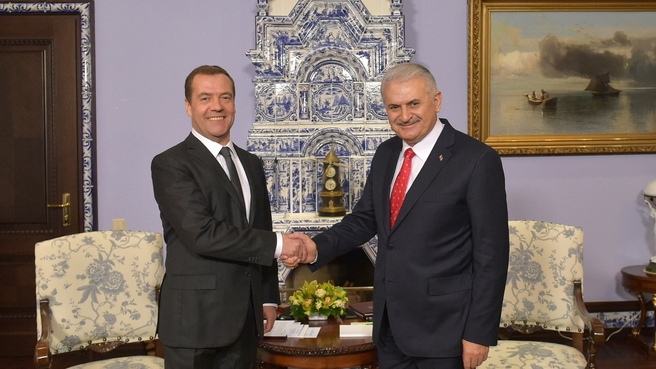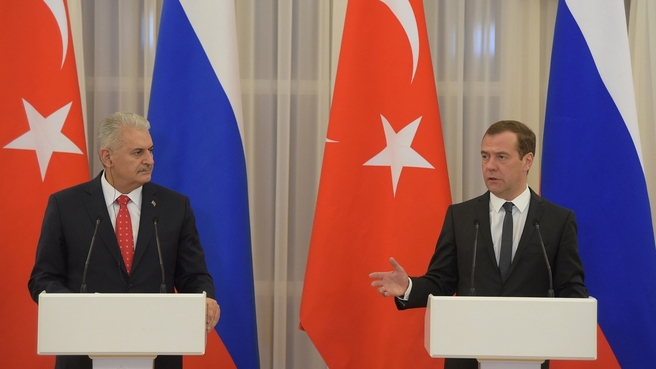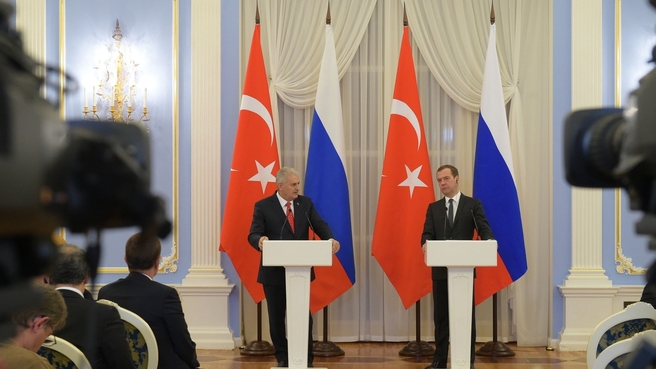The talks focused on the state and prospects of bilateral relations, particularly cooperation in trade, the economy, investment, the oil and gas industry, nuclear power, industrial production, agriculture and tourism.
Meeting with Prime Minister of Turkey Binali Yildirim
News conference of Dmitry Medvedev and Binali Yildirim following talks
Dmitry Medvedev’s meeting with Prime Minister of Turkey Binali Yildirim
Dmitry Medvedev: This is our first meeting with Prime Minister Yildrim and the first meeting between the heads of government in the past few years, considering the difficult period in our relations. We have every chance to conduct a positive meeting.
Historically, Russia and Turkey have extensive trade relations, but due to various reasons, both objective and subjective, these trade ties have decreased of late. We have opportunities to rebuild them and carry out the many major joint projects. The goal of this meeting is to give an extra impetus to economic, investment and humanitarian cooperation.
Binali Yildirim (via interpreter): The relations between our two countries have been quite difficult in the past year. After this negative experience, we intend to expand our relations strategically even more. It is possible, and we have many previous examples of it. We must place great emphasis not only on bilateral relations between Turkey and Russia but on the role of our large states in fighting terrorism and ensuring peace.
We must continue cooperation in trade, the economy, culture and other areas to catch up on lost time. Last August, we took the first steps in this direction. However, we must continue, step by step, and accelerate the process.
<…>
News conference of Dmitry Medvedev and Binali Yildirim following talks
Dmitry Medvedev: We discussed a broad range of topics: trade, investment, energy (both oil and gas and nuclear) and issues related to industry, high technology, agriculture and tourism.
I must say that the progress we’ve made has not been lost despite the problems we recently experienced in our relations. Today we continue working on mutually beneficial projects as we overcome the consequences of the complications we faced.
The main goal today is to reset the mechanism of our trade and economic cooperation. We must resume its steady growth. We agreed to speed up the drafting of programme documents on how we should work in the future and also prepare all the necessary papers for the meeting of the High Level Cooperation Council that is scheduled at the presidential level in the first half of next year.
We also discussed new mechanisms of economic and financial cooperation, including the joint investment fund that can be launched next year. It will accumulate funds for financing various projects, including those in high technology, and I hope it will also work in third countries.
We also discussed major projects, such as the Turkish Stream. The Turkish parliament has already ratified the relevant agreement and President Erdogan signed the law on ratifying the agreement with Russia on the Turkish Stream. We will ratify it in the near future.
We also reviewed issues pertaining to the construction of Turkey’s first nuclear power plant Akkuyu on the basis of a Russian design.
Our Turkish colleagues have informed us that political decisions have been made but need to be duly formalised. This would speed up the implementation of the project and make it easier to attract investors.
We also discussed other issues, including agricultural cooperation and quality control, and a number of other questions that are fairly urgent right now.
I am convinced that, by working together, we have now turned the page on a difficult period in Russian-Turkish relations and can move forward on a new foundation. The current talks will give us the necessary impetus for this.
Binali Yildirim (via interpreter): Our talks took place in a very warm and friendly atmosphere. There were very difficult moments in relations between our countries in the past few years but we have turned the page and must now focus on the future. We must raise our relations back to where they were on 2 November 2015, and higher. We have the required political will for this. Presidents Recep Tayyip Erdogan and Vladimir Putin have worked on this.
The most important thing is to implement our plans. We, both the prime ministers, will monitor their implementation, especially in the energy sphere. Turkey and Russia are carrying out important projects on natural gas in the spirit of strategic partnership. The Turkish Stream is on the agenda on a par with the Blue Stream.
The construction of the Akkuyu nuclear power plant is of strategic importance for us. We will focus on speeding up the implementation of this project. We would like to launch several energy units by the 100th anniversary of the republic.
We had an ambitious goal – to increase our trade to $100 billion. It now stands at $36 billion. The goal of $100 billion is feasible. To achieve this, it is necessary to lift restrictions, ease visa rules and increase the tempo of trade. All this will have a positive influence on the further development of our relations.
We had very good contacts in tourism and we want to restore them to their previous level on the basis of mutual interests.
Question: Did you discuss the possibility of continuing construction of the Turkish Stream to Europe? How much time will it take to grant the Akkuyu Nuclear Power Plant project strategic investment status to receive tax breaks?
Dmitry Medvedev: We indeed discussed the continuation of the Turkish Stream project. The project itself includes two legs, each capable of carrying 15.75 billion cubic metres of natural gas per year. The first leg will supply gas to Turkey for internal purposes while the second leg will deliver it to the Turkish border for further transportation to Europe. Talks on where the delivery point will be located and other infrastructure issues are still ahead but, at any rate, I believe these decisions will benefit Europe and help diversify supplies.
At the same time, this is not a competition with any other natural gas pipelines. The Turkish Stream must become a seamless supplement to the existing supply capacities in the European market and safeguard European consumers from existing risks.
We also covered a few issues related to the Akkuyu project, one of which is its status as a strategic project. Our partners assured us that the status will be granted shortly. This will allow us to understand the market better and seek investment opportunities.
In the meantime, the basic terms of the project remain the same regarding the share distribution at the moment. For a whole number of reasons, this project has been progressing slower than we expected. Now we can pick up speed and make sure that at least the first unit of the nuclear power plant is ready for operation by 2023, the 100th anniversary of the Republic of Turkey.
Binali Yildirim (via interpreter): We decided to grant the Akkuyu NPP strategic status. As far as other licenses are concerned, we will speed up their processing. We do not want to slow down this project. It is a very important facility for diversifying energy sources and energy security. An agreement on the Turkish Stream was recently signed and ratified by parliament. Currently, we are awaiting ratification by Russia. This project has huge significance for European energy security. It is being implemented at the regional level. Both Russia and Turkey are building a foundation for developing and expanding the strategic partnership.
Question (via interpreter): The presidents of the two countries have set the goal of increasing trade to $100 billion. Have the decisions to provide proper conditions for Turkish specialists in Russia been adopted?
Dmitry Medvedev: If we take up major projects and build up cooperation in other areas, $100 billion is quite achievable. We discussed the potential of various integration projects which could expand our trade.
With regard to Turkish experts on the Russian market, a number of restrictions are still in place, but many of those affecting Turkish specialists have been removed. We have enlisted Turkish specialists to work on major projects, including those related to preparations for the FIFA World Cup.
We are willing to do more in this regard, but do so on the basis of reciprocity in several other areas. We must also bear in mind the situation in the Eurasian Economic Union, as a full-fledged economic union has now become operative.
Question: Given the growing threat of terrorism, the safety of tourists in Turkey has become an issue.
Binali Yildirim (via interpreter): The threat of terrorism affects all countries. No country is immune to terrorist attacks. We take appropriate precautions and work closely to share information with intelligence services of the countries concerned. We are certain that we will be able to provide proper and safe conditions for our guests.
Question (via interpreter): Are new consultation mechanisms on Syria being created? Were these issues discussed?
Dmitry Medvedev: We discussed Syria, even though foreign policy is the prerogative of the presidents of our countries, who are in regular contact. We stated that normalising the situation in Syria as a whole is a priority for our countries. However, we believe that reaching a settlement in Syria is an issue that must be primarily resolved through an intra-Syrian dialogue, just like the future of Syria. All of that work should be part of the procedures that have been outlined and prepared by the Syrians themselves.
With regard to the humanitarian situation and other issues, including fighting terrorism and terrorist organisations, these matters are handled not only by the presidents of our countries, but also our respective military and other services. Not long ago there was no such dialogue. However, it has been resumed in full, and we share the same understanding of the terrorist threat.
Binali Yildirim (via interpreter): This issue is being discussed and coordinated at a high level. We have maintained a productive dialogue with Russia in the military and diplomatic sphere lately. We want the humanitarian crisis in Aleppo to end, and we want the people affected to have access to humanitarian aid. Both sides are making efforts to this end. Dividing terrorists and civilians is another critical issue, which is being worked on in Turkey. Turkey wants to stave off this threat. However, we want to create proper conditions for the refugees who have fled their country to be able to go back. The goal of our ongoing operation, Euphrates Shield, is to make this happen. Syria is now closer to a settlement, and steps in this direction will continue.












